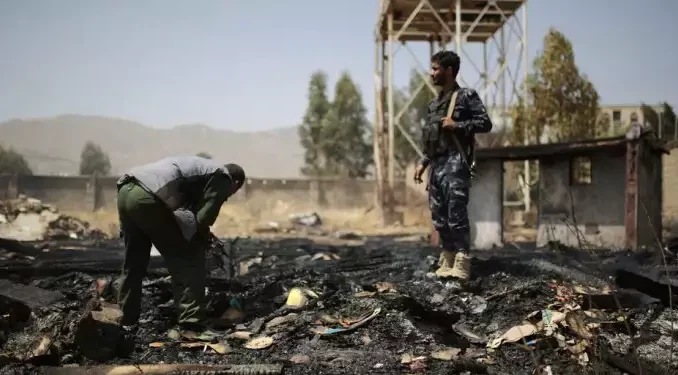It appears Saudi Crown Prince Mohammed bin Salman has exhausted the adventurist phase of his tenure as defense minister. The Houthi rebels, however, cultivated by Iran since the early 2000s, may have outgrown their master.

Yemeni police inspect a site of Saudi-led airstrikes targeting two houses in Sanaa, Yemen, Saturday, March 26, 2022 | Photo: AP/Hani Mohammed
The hudna (truce, in Arabic) in Yemen, which went into effect on April 2, opened a window of opportunity for Riyadh to renew dialogue with Tehran. The Saudis and Iranians had engaged in four rounds of talks since April 2021, but the fifth round, scheduled for March, was postponed following the mass execution of 81 people in Saudi Arabia, including dozens of Shiites.
This was Riyadh’s attempt at exacting revenge for the numerous Houthi attacks on its oil facilities, but its brutality failed to deter anyone and in the ensuing days, facilities in Jeddah and a refinery in Riyadh were attacked. Now, the ceasefire is allowing the sides to return to the negotiating table.
Officials in Saudi Arabia swiftly exploited the cessation of hostilities to reshuffle the Sunni leadership deck in Yemen. In Riyadh, Yemen’s exiled president, Abed Rabbo Mansour Hadi, declared he we ceding power to the presidential council, while his deputy, considered a non-starter by the Iran-backed Houthi militia, was dismissed. Immediately after, Saudi Arabia called on the presidential council, headed by Rashad al-Alimi, to begin negotiations with the Houthis. Al-Alimi wasted little time before declaring his intention to reach a resolution to the war. Such is the result when Saudi Arabia and the United Arab Emirates have promised to give Yemen billions of dollars.
London-based pan-Arab newspaper Al-Araby Al-Jadeed reported that officials in Baghdad were trying to set a date for the fifth round. Nevertheless, large gaps between the sides remain. The Iranians want to define exactly what the sides will discuss, and the Saudi foreign minister noted that little if any progress had been made in the previous rounds of talks.
According to an official in the Iraqi foreign ministry, who spoke to Al-Araby Al-Jadeed, Iran, among other things, wants Saudi Arabia to stop executing Shiite detainees. This is reverberation from the 2016 execution of prominent oppositionist Shiite cleric Nimr Baqir al-Nimr, which severed diplomatic ties between Saudi Arabia and Iran. Al-Nimr was an active proponent of the Shiite demonstrations that erupted in Saudi Arabia in 2011, which were subsequently squashed with an iron fist, but also of financial benefits. He bought his reputation as a gifted preacher and fighter for minority rights in the kingdom. Even if the demonstrations stemmed at the time from ongoing neglect of the Shiites in the country, Iran was immediately suspected of being behind the unrest. Another of Riyadh’s concerns pertains to the presence of the Shiite minority in the country’s northeast, where its oil fields are located.
It appears Saudi Crown Prince Mohammed bin Salman has exhausted the adventurist phase of his tenure as defense minister. Similar to the boycott of Qatar, in which the Saudis and their allies ultimately retreated from their demands, the crown prince understands the time has come to cut his losses and push for a resolution. Additionally, officials in Iran’s foreign ministry expect to receive Saudi Arabia’s positions in writing before any dialogue. In Iran, too, there are those who, at the very least, want to temporarily lower the flames. Saudi Arabia’s burning oil facilities have exacerbated suspicions in Vienna and hindered prospects of a nuclear deal being finalized between Iran and world powers. It’s not for nothing that the United States declared sanctions against Tehran’s ballistic missile program after the attack in Jeddah.
The ceasefire, or hudna, meanwhile, could collapse at any moment. The warring sides almost immediately accused one another of violating the truce by advancing forces in the oil- and gas-rich Marib province, which the Houthis have been trying to capture for over a year from pro-government Saudi-led coalition forces. Ironically, it is the Houthis’ appetite, of all things, that could sabotage Iran’s interests in reaching understandings with Saudi Arabia about its Shiite minority, and finalizing a new nuclear deal. Since the early 2000s, Iran has cultivated the Houthis militarily and financially, and from the perspective of morale. It seems now that Tehran’s creation may have outgrown its master.



Leave a Reply
You must be logged in to post a comment.